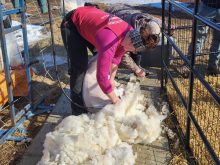RED DEER – The decision to go organic was an easy one for many New England dairy farms on the brink of bankruptcy.
“They saw a higher profit potential and that is why they did it,” said Richard Kersbergen, a dairy specialist with the University of Maine.
For many American dairy farmers, it was the last chance before they were forced to leave the industry. A recent university survey found nearly half did it for economic reasons. About 30 percent wanted stable milk prices and nine percent said it was for ethical reasons.
Read Also

Charges laid after cattle theft
Saskatchewan RCMP lay two charges against a man after six cattle went missing.
The organic business offered 65 cents per kilogram as well as cash incentives and bonuses. That has caught the attention of mainstream producers who want to earn twice as much money compared to traditional production.
“The farms that are transitioning are seeing a profit potential and many of them are good managers,” Kersbergen said at the Western Canadian Dairy Seminar in Red Deer earlier this month.
The good managers claim they have achieved as much as 11 percent return on assets and 13 percent return on equity.
However, it is hard to say how long the price premium might hold as more large corporate farms produce organic milk.
The turning point for milk prices may be this July when a large number of farms achieve certification and their milk comes on the market.
Organic dairy farms in the United States have 105,000 milking cows, which is expected to double in the next 36 months.
Switching to organic production is not easy because the land must be chemical free for three years and the cows raised organically for one year before certification is granted. Feed must be 100 percent organic and young stock must come from organic farms.
“It is a long-term decision so it needs a lot of careful thought,” Kersbergen said.
Antibiotics and hormones aren’t allowed, although some vaccines are permitted. Calves must receive whole milk rather than milk replacer and are weaned at three to four months rather than eight weeks.
All cattle need reasonable access to outdoors, but different certifying bodies appear to have different allowances on space and conditions.
Meat from cull cows and calves is deemed organic so that also adds value to the farm.
Producers who switch to organic production face adjustments because cows tend to produce less. Cows in Maine produce about 18 kg of milk per day compared to the average Wisconsin cow raised in traditional conditions that produces 23.5 kg per day.
Finding the right feed costs about $1,000 US per cow per year. Problems with feed consistency and quality have been reported.
Farmers who switch to organic production say their vet and drug bills are lower because the cows are under less stress and seem to suffer less mastitis.
Critics charge that the organic system is management by neglect because sick animals can suffer without treatment from antibiotics.
However, Kersbergen said organic farmers are paid for quality milk and to meet contract agreements they must be good managers and care for cows properly. Studies show somatic cell counts on organic farms do not appear different from traditional farms.
Certification standards in Canada and the United States are similar.
Like the U.S., the Canadian organic system is growing.
As of the end of 2005, 7,115 head were raised under organic conditions with nearly 4,000 in Ontario, 1,820 in British Columbia and 1,225 in Quebec.
There are 15,500 dairy farms in Canada and about one million head of cattle, according to the Canadian Dairy Information Centre.

















